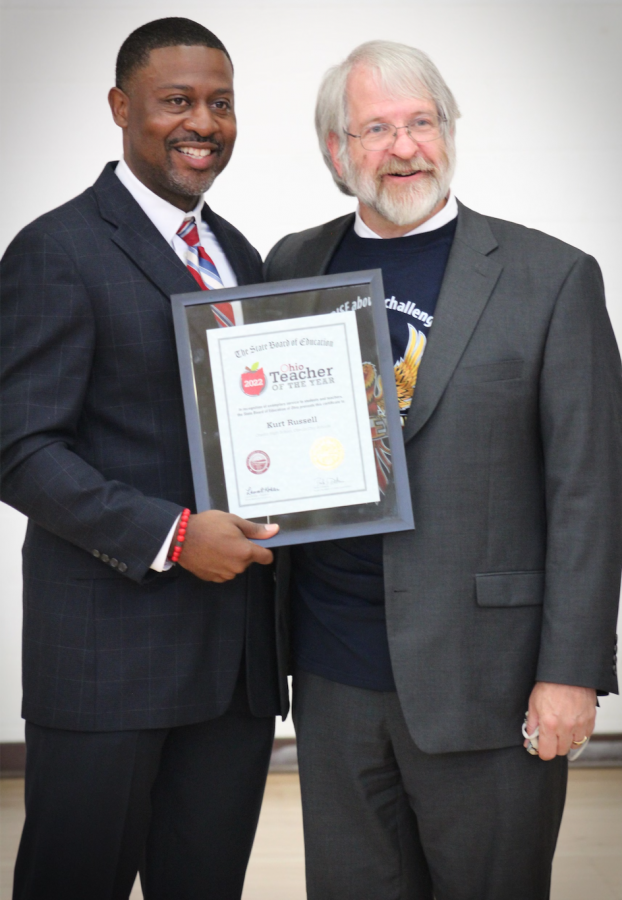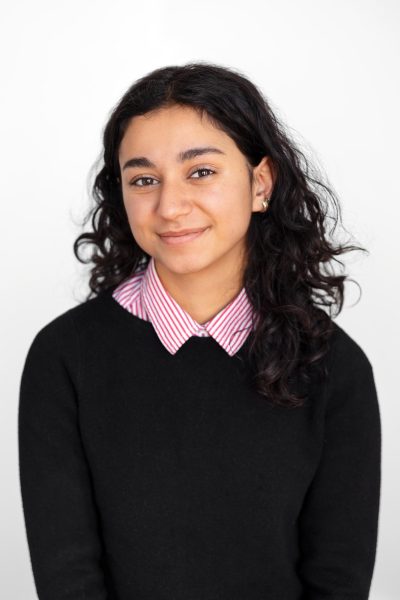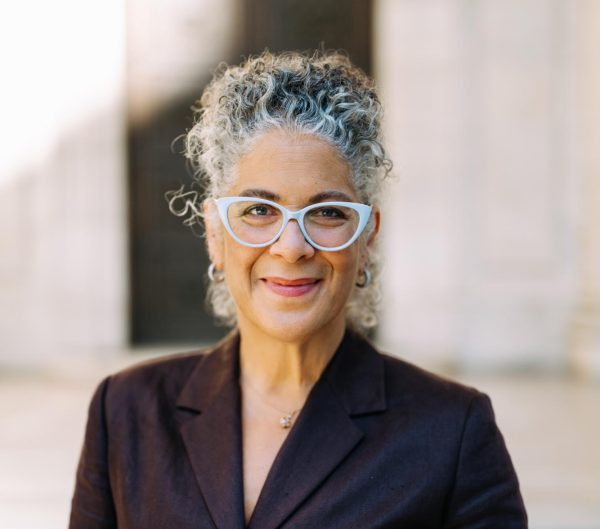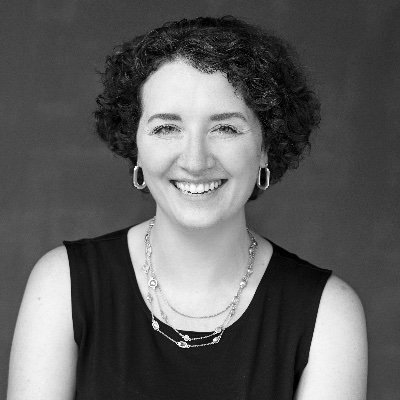Off the Cuff with Ohio Teacher of the Year Kurt Russell
Courtesy of Oberlin City Schools
Kurt Russell (left) recieves his award from State Superintendent of Public Instruction Mr. Paolo DeMaria
Kurt Russell is a social studies teacher at Oberlin High School and the 2022 Ohio Teacher of the Year. Russell has been an educator for the last 25 years. After listening to feedback from students about how whitewashed history curricula in the U.S. was, Russell started teaching an African-Amerian History class in the late ’90s. Ten years ago, he also developed a new class called Race, Gender, and Oppression. With Oberlin Professor Emerita Dr. Carol Lasser, Russell developed a course titled Oberlin History is American History. Besides teaching, Russell is also an advisor for the Black Student Union and the school basketball coach. The Review sat down with Russell to discuss how he became interested in teaching and how current events impact his role as an educator.
This interview has been edited for length and clarity.
Could you explain your backstory about how you got into teaching history?
I became a history teacher because of three simple pictures. Both my parents grew up in segregated Alabama in the 1950s and 1960s with Jim Crow, and all my family members for some odd reason had these three pictures. In the center was a picture of Jesus, on one side was a picture of Martin Luther King Jr., and the other side was a picture of JFK. I grew up in the church, so I knew about Jesus, but I did not know about who the other gentlemen were. My parents purchased a set of encyclopedias when I was maybe 6, 7 years of age, and I used these encyclopedias to start researching. Who was Martin Luther King Jr.? Who was Malcom X? Who was John Lewis? That’s how I fell in love with history.
From there, I had a kindergarten teacher by the name of Ms. Francine Toss, who actually works downtown at the Carlyle Flower Shop. For some reason, when she taught a lesson, it seemed as though I was the only one in the class. My eighth-grade year was the first time I had a Black male teacher, and my eyes lit up because I saw myself in this gentleman. His name was Mr. Larry Thomas.
How does having those powerful first experiences with history connect to your high school teaching today?
I always tell individuals that I see myself not as someone who is trying to make people fall in love with history, but as someone who is trying to make people feel authentic. I give students the empowerment to be able to think for themselves and to feel comfortable in the way they think about subject matter so that they can stand alone if need be.
There is a lot of discourse around teaching history that incorporates more marginalized perspectives. Currently, we see this national debate over Critical Race Theory in schools. As a history teacher, how does this impact you?
To be honest, it doesn’t affect me one bit because I know where my values lie. There is no way I could be a history teacher without teaching history. I’ll make this analogy: There would be an uproar if I was a math teacher, and said five plus five equals 13. There is no way I can teach our history without speaking about some of the ills of our country. If I don’t do that, I’m doing a disservice to my kids. There are values I have as a teacher, and I will not shortchange those.
At the same time, I do not try to change my students’ mindsets or opinions. I say, “This has happened, these are the facts, but what do you think about it?” I’m so shocked to see adults thinking that kids cannot comprehend complexity; trying to shelter kids from the past because it would make them uncomfortable. No, our kids are strong enough to handle that. I think it’s just disrespectful for us, as adults and as history teachers, to not provide true information.
I’d like to talk about the broader era that we live in and what role you see history playing in this age of layered crises. We have the COVID-19 pandemic, an ongoing reckoning of racial justice protests, families struggling economically, and I am wondering how much thought you give that in the classroom.
I take what’s happening today and base my units on that. That is what my Race, Gender and Oppression class is formed around. This semester, I’m teaching a class on economic oppression that deals with the struggles of individuals in po verty.
We also cannot talk about the formation of the Constitution without talking about what’s happening today. I have realized this: if you don’t make things relevant, you’re going to lose kids. You’re going to lose the engagement, so you have to make the lesson of the past relevant for today and for the future.
How do you establish trust with students on a personal level, as opposed to simply making the curriculum more inclusive?
My students and myself, we have trust in one another. What they say in the classroom I do not share with other faculty members. We have norms that are non-negotiable; we all abide by them, and it works very well. Once that trust happens, then those relationships are built, and then you provide equity within the classroom.
I need to make sure that students understand that I’m in the trenches with them. I’m not bigger than they are. I’m not more important. I am willing to fail. I have a degree behind my name, which is why I’m teaching, but at the same time, I’m learning from the students as well.










